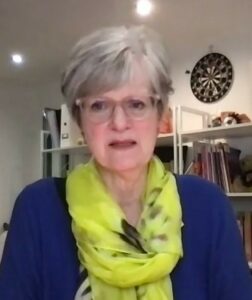 On Monday 22nd January, Soroptimist International St Albans and District hosted an important talk on Zoom with Judith Leary-Joyce, author of the “Beginner’s Guide to Eco Renovation”. Judith is a great speaker – energising and motivating – a real inspiration.
On Monday 22nd January, Soroptimist International St Albans and District hosted an important talk on Zoom with Judith Leary-Joyce, author of the “Beginner’s Guide to Eco Renovation”. Judith is a great speaker – energising and motivating – a real inspiration.
You and your builder can help save the planet – the why and how of making your home more energy efficient and sustainable.
At the end of the event we heard from Amanda Yorwerth from Friends of the Earth about the important and very relevant “United for Warm Homes” campaign – please scroll down for more information.
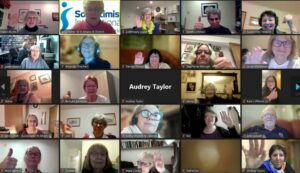
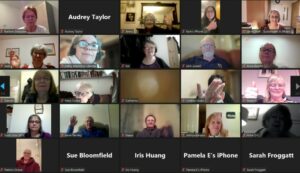 40 people attended the Zoom with Judith – from far and wide, Soroptimists and non-Soroptimists. The guests from Taiwan were from the furthest away, and we also had guests from all over the UK including Yorkshire, Cheshire and Devon.
40 people attended the Zoom with Judith – from far and wide, Soroptimists and non-Soroptimists. The guests from Taiwan were from the furthest away, and we also had guests from all over the UK including Yorkshire, Cheshire and Devon.
Since 21% of emissions in the UK come from leaky homes, reducing this impact is vital in the fight to achieve net zero and tackle the climate crisis. We have already explored ways to build new environmentally friendly “passive” homes but what about the many existing homes we live in – what can and should we do about them?
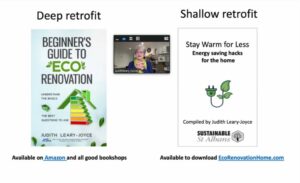 The Club’s Planet Team invited Judith to share her knowledge and experience gained retrofitting her own 1901 Victorian end of terrace home in St Albans. Judith’s practical approach and resilience, which helped her find solutions where everyday building practice did not appear to offer any, will inspire you to tackle your own home.
The Club’s Planet Team invited Judith to share her knowledge and experience gained retrofitting her own 1901 Victorian end of terrace home in St Albans. Judith’s practical approach and resilience, which helped her find solutions where everyday building practice did not appear to offer any, will inspire you to tackle your own home.
Helen Byrne, introduced Judith and started with a poll asking the question: Where are you with Eco-Renovation?
- Currently improving my home – 12%
- Planning to improve my home – 18%
- Interested in energy efficiency – 61%
- New to this and wanting to know more 9%
Judith’s presentation can be downloaded here: Soroptimist retrofit talk Jan 2024 Judith Leary-Joyce
The Zoom was recorded and can be viewed on YouTube https://www.youtube.com/watch?v=Coewt6Q1PSU it is about 1 hour long.
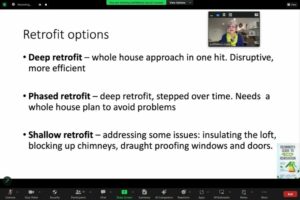 Judith’s background is in Social Work and Psychotherapy and after retirement she developed a passion for insulation. She spoke about the benefits of insulation – having a warmer home with lower energy bills which is more efficient.
Judith’s background is in Social Work and Psychotherapy and after retirement she developed a passion for insulation. She spoke about the benefits of insulation – having a warmer home with lower energy bills which is more efficient.
They have lived in their home for 46 years and this began initially as a project to convert the conservatory into a room and they wanted the conversion to create a more energy efficient living space. She began with getting a design created by an Eco Architect. During this time the plan was expanded, and the project became one to retrofit the whole home to make it an eco-home. Judith explained that the term retrofit was used as they were installing technology that wasn’t included when the house was initially built.
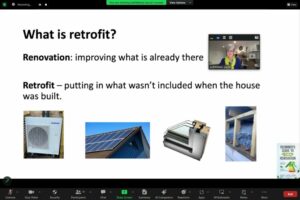 They have now saved 75% of their energy usage and added value to their home. It is now warm in the winter (and can be kept cool in the summer too).
They have now saved 75% of their energy usage and added value to their home. It is now warm in the winter (and can be kept cool in the summer too).
Throughout the process she developed an expertise on the terminology and process needed to complete the task and decided to create a layman’s guide for others wanting to take on a similar project. She said that the building profession and industry has a long way to go… She explained the three levels of retrofitting, deep (retrofitting the whole home as one project), phased (working through the house in stages) and shallow (taking steps to create a more energy efficient home without the building work). A shallow retrofit is an approach anyone can undertake, even if they do not own their own 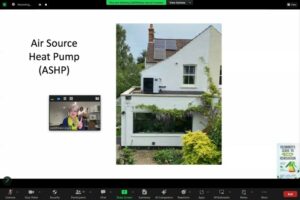 home. Judith shared the pdf booklet she had created on the subject – it is on Judith’s website https://ecorenovationhome.com. Judith said that 90% of homes can be improved
home. Judith shared the pdf booklet she had created on the subject – it is on Judith’s website https://ecorenovationhome.com. Judith said that 90% of homes can be improved
Judith talked about the importance of establishing your priorities and goals when undertaking a project like this. These include climate, budget and design. This became a touchstone and guided the decision-making process.
She talked about how insulation increases the barrier between the inside and the outside. The next step is to test how airtight the space is. This can be done using a piece 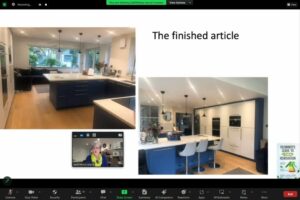 of equipment that pushes air out of the space so that the draughty spaces can be filled. There still needs to be air flow but the aim is to control this through a heat recovery ventilation system. Effective ventilation should stop the build-up of condensation. They installed an Air Sourced Heat Pump (ASHP).
of equipment that pushes air out of the space so that the draughty spaces can be filled. There still needs to be air flow but the aim is to control this through a heat recovery ventilation system. Effective ventilation should stop the build-up of condensation. They installed an Air Sourced Heat Pump (ASHP).
Judith was very proud that most of the things that had to be removed from the house (e.g the kitchen) were either reused, rehomed or recycled.
Proceeds from Judith’s book “Beginners Guide to Eco Renovation” go to Friends of the Earth (see below for the link to buy it).
There was one very valid comment in the Zoom chat: “I’m renting so don’t have control over this but we still do everything we can to be as energy efficient as possible.” There is clearly much work to be done with landlords.
There was time for plenty of questions in the Q&A:
Q: What type of insulation did you use please?
A: Wood fibre for most of the house plus a little recycled fabric in the bathroom.
Q: Are there any forums where I can find out more?
A: There are groups on Facebook you can join to get advice on different Eco-insulation that is advertised. Eco Insulation Companies Judith recommended are https://unitylime.co.uk/ in Aylesbury and https://www.ecologicalbuildingsystems.com which is based in Cumbria.
Q: Has Judith any advice for choosing a builder?
A: Work on getting yourself well informed as many builders aren’t familiar with this kind of building project. Judith has one she would recommend.
Q: Does an ASHP need to be close to the existing boiler piping? Or can it be sited elsewhere?
A: It depends on the pipes – you will need more for further away from the hot water tank and they need to be insulated. A: from another attendee: Ours is at the other side of the house – they fed the pipes along the landing under the floor boards.
Q: Did you have a budget for the retro-fit and if so did it go over the budget?
A: They went over budget by about £30K.
Q: What would you say would be the first three priorities one should have if approaching a shallow refit?
A: First priority is to hire a Thermal Imaging Camera to see where your house loses heat from. This can be done through the Sustainable St Albans group.
Q: Were your solar panels expensive?
A: They are becoming more affordable so quicker to pay for themselves. We are adding more – you don’t have to install them all in one go.
Q: What about keeping summer heat out? Does an ASHP work in reverse?
A: It should do. Not tested in our home. If we seal the house on hot days it stays cool because insulation keeps the heat out.
Q: You spoke about removing tiles on a roof and retrofitting insulation – was that very expensive?
A: It needn’t be – depends how much you are willing to do yourself.
Q: You spoke about how important it is to get appropriate ventilation in. What is the type of ventilation that one should be looking at – like the white boxes that you mentioned?
A: Yes you MUST! Trickle vents are not enough. Heat recovery units – you can get for single rooms and add them afterwards – you just need an outside wall.
Q: Looking at buying a house – what to look for?
A: What is the possibility of making it an eco-house? Make sure you are well informed. Ask about what has been done already – insulation, windows. Is it suitable for solar panels?
Judith said she is always happy to answer questions – you can contact her through her website.
There is lots of information in Judith’s book.
Diana Kingham thanked Judith for her interesting and inspiring talk.
Judith offered to host an open house for anyone interested in learning more. The St Albans Soroptimist Club will co-ordinate. Some Members of the Club’s Planet Team had visited ahead of this event and were really inspired.
There was some great feedback for Judith after her talk: “Thank you very much Judith, that’s been very helpful”. “Thank you Judith. Stimulating talk.” “Thank you so much!”. “Thank you very much. Very informative and interesting!” “Really useful and interesting talk.” “Thanks Judith for sharing & thanks SI St Albans for making meeting available for us all.” “Thanks Judith – you’re an inspiration!”
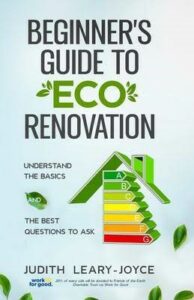 Judith’s book “Beginners Guide to Eco Renovation: understanding the basics and the best questions to ask” is good value and easy to read – the equivalent of sitting down over coffee to learn from each other’s experiences. You can buy it from most book shops and from Amazon by clicking on this link https://amzn.to/3EOBHjM . Judith has a blog on all things to do with eco renovation – ecorenovationhome.com where you can also download her free simple guide to saving money on heating bills “Stay warm for less”.
Judith’s book “Beginners Guide to Eco Renovation: understanding the basics and the best questions to ask” is good value and easy to read – the equivalent of sitting down over coffee to learn from each other’s experiences. You can buy it from most book shops and from Amazon by clicking on this link https://amzn.to/3EOBHjM . Judith has a blog on all things to do with eco renovation – ecorenovationhome.com where you can also download her free simple guide to saving money on heating bills “Stay warm for less”.
Judith’s TEDx talk is also available to view here (it’s only 13 mins long): https://www.youtube.com/watch?v=SbN7sUauhWM&t=653s
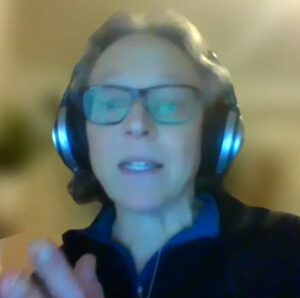 We also heard from Amanda Yorwerth from Friends of the Earth about the “United for Warm Homes” campaign which is very relevant to Judith’s talk. Fuel poverty and climate change has a affects women more than men so this is really important for Soroptimists. Click here to find out more www.stalbansfoe.org/united-for-warm-homes.
We also heard from Amanda Yorwerth from Friends of the Earth about the “United for Warm Homes” campaign which is very relevant to Judith’s talk. Fuel poverty and climate change has a affects women more than men so this is really important for Soroptimists. Click here to find out more www.stalbansfoe.org/united-for-warm-homes.
United for Warm Homes is calling for:
- Urgent support for people dealing with sky-high energy bills.
- A new emergency programme to insulate our heat-leaking homes.
- An energy system powered by cheap, green renewables.
Donations were asked for Friends of the Earth (as are the proceeds from Judith’s book) . Please email sistalbans@hotmail.com and ask for the details to do a bank transfer.
If you have any questions please email sistalbans@hotmail.co.uk

